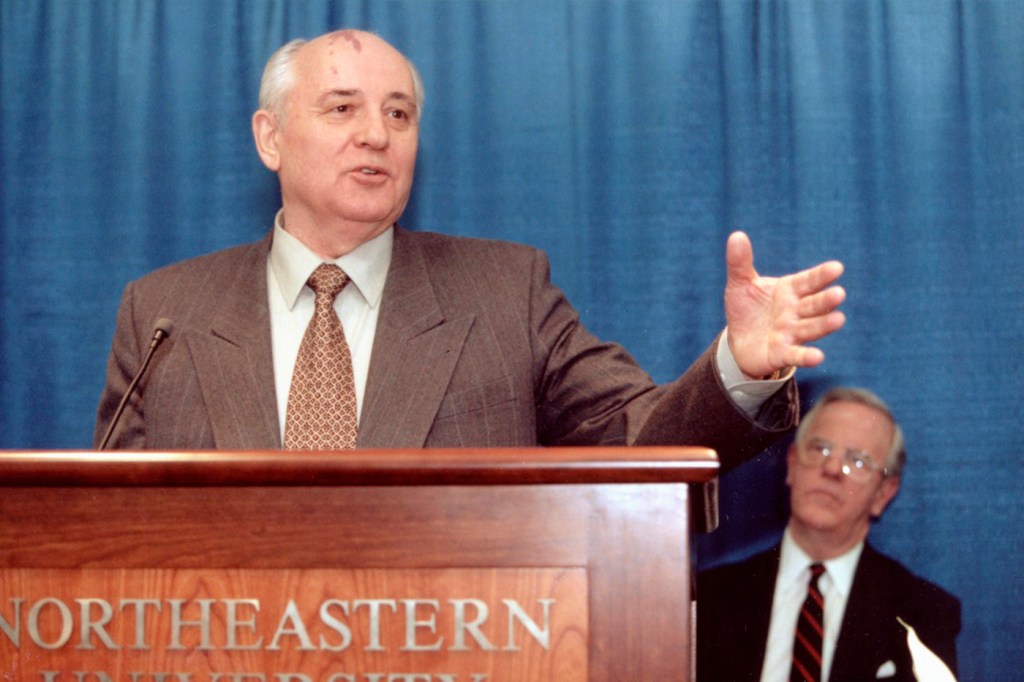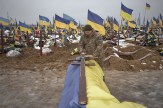Mikhail Gorbachev, dead at 91, warned Northeastern grads in 1998 about ‘enforced utopia’

Former Soviet Union President Mikhail Gorbachev, who died at age 91 Tuesday, told 1,600 Northeastern University graduates in June of 1998 to “be optimists” and work for world peace.
“Please remember one lesson of the 20th century,” he said through an interpreter. “One cannot impose happiness on nations by imposing any kind of enforced utopia.”
“The Russian people paid a great price,” he said.
Serving from 1985 to 1991, Gorbachev was the last leader of the Union of Soviet Socialist Republics. He tried to revitalize the Communist country through “perestroika” and “glasnost,” but the restructuring and openness led to the nation’s demise and the dissolution of the Communist bloc.
Jeffrey Burds, associate professor of Russian and Soviet history at Northeastern, says Gorbachev was trying to tell Northeastern students that: “Reform is great if we build it together. It never works when imposed from above.”
Gorbachev was a “world-changing figure,” says Burds, but like so many great leaders, he was flawed.
Gorbachev received the 1990 Nobel Peace Prize for his role in ending the Cold War. However, his reform policies ultimately caused the collapse of the Soviet Union, freeing of Eastern European countries from Russian rule, the reunification of Germany and nuclear arms agreements.
After an attempted coup failed in August 1991, the republics began declaring independence and he resigned on Dec. 25, 1991.
“Gorbachev is loved and respected everywhere but in Russia, where he is hated for his primary role in dismantling Soviet power,” Burds says.
Peter Fraunholtz, Northeastern assistant teaching professor in history and international affairs, agreed.
“Gorbachev was a complicated person and leader,” Fraunholtz says. “He wasn’t really well-liked in the Soviet Union at all. … He was much more popular abroad.”
Seven years after his resignation, Gorbachev addressed Northeastern graduates during Commencement. According to the Associated Press report, Gorbachev praised Northeastern in his 1998 address as “a place where all classes of people are educated.”
The AP reported that at the time of his own emotional graduation from Moscow State University, the former Soviet president recalled, “I had not even an inkling I would be called upon to lead a nuclear power.” He told Northeastern graduates to learn to accept both their successes and failures with dignity. Those graduating on the eve of the 21st century carried a large burden of responsibility, he said.
“As the 20th century was beginning, people thought it would be a golden age of peace and prosperity,” he told Northeastern graduates. “As we know, it turned out to be a very difficult century.”
He also called on graduates to work to make it a century of prosperity, while allowing for diversity and peace, the AP reported.
Gorbachev was awarded an honorary doctorate in international affairs, while his wife, Raisa, received an honorary doctorate in social sciences.
Gretchen Heefner, associate professor of history at Northeastern, says Gorbachev was trying to reform Communism, not end it. He was trying to “free up the Soviet system so it could flourish – not to set in motion the steps to its demise.”
In his speech to Northeastern graduates in 1998, Heefner says, Gorbachev was offering words of caution.
“On the most basic level, he was warning against strict ideological thinking, of applying seemingly simple solutions to the complexities of social, economic, and political [issues],” Heefner says.
Fraunholtz, who spent nearly two years in Russia in the 1990s, says that inside the Soviet Union Gorbachev was seen as weak, as a compromiser, and in Russia, that is looked down upon. Putin, he says, recognizes that and now presents himself as the anti-Gorbachev.
“Putin’s legitimacy and popularity, to whatever extent he has, is being strong and not being like his predecessors. People appreciate his strength,” Fraunholtz says.
According to Fraunholtz, Gorbachev tried to revitalize the country through reforms, especially with the economy, which had been stagnant. He also negotiated with U.S. President Ronald Reagan. However, decades of problems and excessive defense spending had crushed the Soviet economy. The Soviet Union was both in an arms race with the United States and fighting the costly Afghan War.
“There were so many underlying problems that had persisted for about 20 years that hadn’t been addressed,” Fraunholtz says.
“In the final analysis, dynamics unleashed were too big for any leader. No one was going to stop that tsunami,” he says.
Gorbachev was born on March 2, 1931, in the Southern Russia village of Privolnoye. Both of his grandfathers and his father were peasants, collective farm chairmen and members of the Communist Party. Gorbachev’s grandfathers were arrested and imprisoned for allegedly anti-Soviet activities during the terror unleashed by Soviet dictator Josef Stalin.
Gorbachev earned acceptance into Moscow State University, where he met his wife, Raisa Maximovna Titorenko, and joined the Communist Party. He completed his law degree in 1955. He was elected to the powerful party Central Committee in 1971, took over Soviet agricultural policy in 1978, and became a full Politburo member in 1980, the Associated Press reported.
“He came of age during [Soviet leader Nikita] Khrushchev’s Thaw––a time of great cultural relaxation and optimism in the Soviet Union,” Burds says. “Gorbachev rose to power internally through the communist ranks––a reliable cadre, but also an enthusiastic true believer in the efficacy of socialism.”
The official Russian news agency Tass reported that Gorbachev will be buried at Moscow’s Novodevichy Cemetery next to his wife.
“He will not be buried in the Kremlin wall like other Soviet leaders. He will be buried next to his wife at Novodevichy Cemetery in south Moscow, the burial place for that other ‘renegade’ Khrushchev.”
For media inquiries, please contact media@northeastern.edu.






